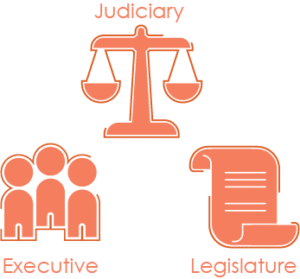Open, Independent and Impartial Judiciary
 In our Australian system of government, we have a judiciary that is separated from the other arms of government (the executive and the legislature), based on a doctrine known as the separation of powers. The peace and good order of our society depends heavily upon the maintenance of an independent judiciary as the third arm of government and our Constitution ensures there is a clear separation between the three arms of government.
In our Australian system of government, we have a judiciary that is separated from the other arms of government (the executive and the legislature), based on a doctrine known as the separation of powers. The peace and good order of our society depends heavily upon the maintenance of an independent judiciary as the third arm of government and our Constitution ensures there is a clear separation between the three arms of government.
The ‘judiciary’ is a collective term which refers to the judicial arm of government. It is comprised of courts, judicial officers and other personnel who are involved in the administration of justice.
The scope of the powers of courts and tribunals at federal and state levels is clearly defined in legislation. Both federal and state jurisdictions have their own court systems and hierarchies, at the top of which sits the High Court of Australia. The High Court of Australia is the apex court of appeal in Australia.

The intention behind the Australian Constitution is to create checks and balances through a clear separation of the judiciary from other arms of government is to ensure power is not held by one single person or body of people.
A person’s right to be afforded procedural fairness and to face trial before an open, independent and impartial court and judicial officer is a hallmark of our justice system. Individuals can expect to face a public trial before a judicial officer who is absent of bias including the objective perception of bias.
Open Justice through an independent and impartial court are rule of law concepts that have a very long heritage, dating back to before the Magna Carta and established in common law in Australia and recognised by Article 14 of the International Covenant on Civil and Political Rights.
There can be no rule of law without an independent judiciary. The equal treatment of all under the law is not possible without independent and unbiased judges to interpret and apply the law
-Richard J Goldstone Retired justice of the Constitutional Court of South Africa
Independent and Impartial
Judicial officers should be free to administer justice based on an interpretation of written laws, the common law and the merits of a case, without the external pressure of government, the media or the general public. To ensure impartiality in the judiciary, judicial officers must avoid external biases or personal opinions that could affect their judgements: they must apply the law independently and transparently.
The oath that Australian judicial officers take before their appointment is ‘[to] do right to all manner of people according to law without fear or favour, affection or ill will’ .
An ‘independent’ and ‘impartial’ judiciary ensures that:
- The judiciary shall decide matters after an impartial assessment of the facts and their application to the law, without improper influences, direct or indirect, from any source.
- The general public can feel confident that matters will be decided in accordance with the law and be absent of the objective perception of bias.
- Judicial decisions are subject to review and/or appeal.
- Justice is not only done, but seen to be done.

The reason why judicial independence is of such public importance is that a free society exists only so long as it is governed by the rule of law … administered impartially and treating equally all those who seek its remedies or against whom its remedies are sought. However vaguely it may be perceived, however unarticulated may be the thought, there is an aspiration in the hearts of all men and women for the rule of law
– The Hon Sir Gerard Brennan, AC KBE, Former Chief Justice of Australia.
If we are to be governed by the rule of law, we must have a Judicature to administer it. The characteristics of that Judicature reflect the functions it is charged to perform. First, it must be a Judicature that is and is seen to be impartial, independent of government and of any other centre of financial or social power, incorruptible by prospects of reward or personal advancement and fearless in applying the law irrespective of popular acclaim or criticism. Second, it must be a competent Judicature; there must be judges and practitioners who know the law and its purpose, who are alive to the connection between abstract legal principle and its practical effect, who accept and observe the limitations on judicial power and who, within those limitations, develop or assist in developing the law to answer the needs of society from time to time. Third, it must be a Judicature that has the confidence of the people, without which it loses its authority and thereby loses its ability to perform its functions. Fourth, it must be a Judicature that is reasonably accessible to those who have a genuine need for its remedies
-Former Chief Justice Gerard Brennan and ‘The State of the Judicature’ speech delivered by him on 19 September 1997
